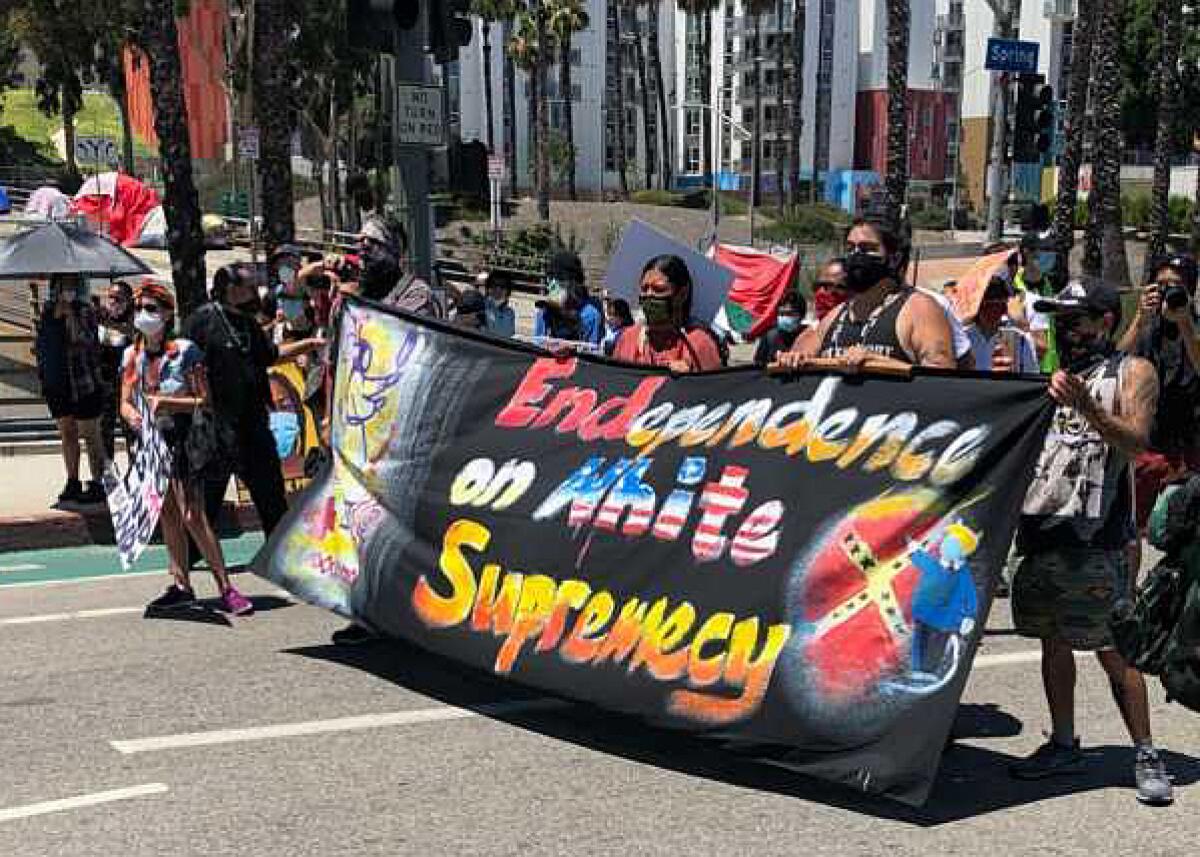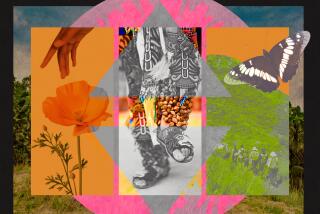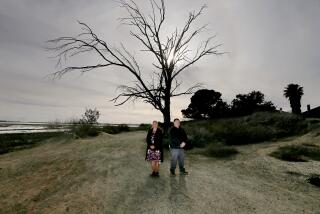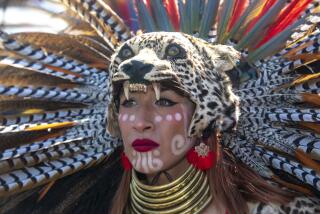Indigenous groups, Black Lives Matter join forces to decry historical ‘sins’ on July 4

Members of indigenous groups joined forces with Black Lives Matter organizers and other demonstrators Saturday afternoon near Olvera Street in a peaceful, masked protest and march that called for several actions, such as unity among minorities and an acknowledgment of the nation’s many sins on its birthday.
Some burned incense, tobacco and sage, others spoke of the “Farce of July,” and many marched to Grand Park and beyond with signs calling for the abolishment of ICE, the “defunding of the police” and justice for Andrés Guardado, Breonna Taylor, George Floyd and others slain by law enforcement.
Indigenous leader Shannon Rivers of the Akimel O’otham people called on about 400 gatherers to “decolonize” their minds. He said the current coronavirus spread, which has caused more than 125,000 deaths, wasn’t the first plague to visit this continent.
The Europeans “brought many pandemics” to the peoples of the Americas, Rivers said, drawing the applause of a largely socially distanced crowd. Instead of celebrating with fireworks, he said, it would be best to understand “the many lies” taught to American youth that prop up white supremacy at the cost of all native peoples and minorities.
One falsehood referenced was the Declaration of Independence, which provided freedom to “white men” at the cost of everyone else, Rivers said. He also noted the American military failed to protect Vanessa Guillén, a Latina soldier killed at Ft. Hood, who signed up to defend this country.
Rivers also called on Black Lives Matter to join the indigenous movement before saying forcefully, “Black lives matter.”
The first set of people began to congregate near the grassy patch of land adjacent to Father Serra Park, where a statute of the field’s namesake was ripped down June 20 by a group of protesters that included many indigenous people.
There were blessings and prayers said before the march, along with chants from indigenous groups, performances by Mejicas dancers, drumming and song from Capoeiristas for Black Lives Matter and speeches from Black Lives Matter members and backers. A young woman claiming to be from the Palestinian Youth Movement called for a “free, free Palestine.”
As people gathered, there was little social distancing, though the vast majority of participants were masked. Organizer Jessa Calderon of the Tongva Nation quickly asked for the growing group to maintain six feet of distancing, which was generally followed except for sections of the march along Arcadia Street where some corridors were tight.
Marchers momentarily blocked traffic along Alameda and later on Spring Street, causing brief traffic delays. Calderon also spoke passionately about justice for Guillén, saying “my heart extends to her family and everyone who loves her and is marching for answers.
Throughout the march, Calderon pointed out historic portions of the Tongva homeland, including what she said was a native graveyard near Olvera Street that had been paved over to make room for a parking lot.
One of the Tongva’s biggest communities was a settlement called Yagna, which is believed to be near the Civic Center.
Dakota/Ho-Chunk Tribe member George Funmaker, 37, made the short trip from Long Beach in solidarity with the Black Lives Matter movement and to set the record straight.
Funmaker said “protesters” was the wrong designation for those who gathered for social justice, preferring instead to use the term “protectors.”
“We’ve come in peace to say we stand with our brothers and sisters from Black Lives Matter and other indigenous movements throughout the nation,” Funmaker said. “Our goal is a safe society where our children and grandchildren can live peacefully.”
Funmaker wore a black bandana that draped over his face and the upper portion of a black T-shirt with a deformed version of the mascot of the Cleveland Indians baseball team known as “Chief Wahoo.”
Normally, depictions of Chief Wahoo represent a red-faced Indian with a giant, toothy smile and a feather attached to the back of his head. Funmaker’s version had blacked-out eyes, a cut off nose and cracked teeth with the words “mis-rep” underneath.
He called on American professional and collegiate sports teams to drop all Native American references, such as Cleveland, the Atlanta Braves, Florida State Seminoles and perhaps the most notorious of all, the Washington Redskins football team.
“We are not mascots,” Funmaker said. He also expressed his disappointment with the mainstream media’s attention of President Trump’s speech at Mt. Rushmore on Friday on how little attention focused on Lakota-led protests earlier in the day.
“The Black Hills, where Mt. Rushmore is located, is sacred to the Lakota,” Funmaker said. “That’s where the attention should be on.”
More to Read
Sign up for Essential California
The most important California stories and recommendations in your inbox every morning.
You may occasionally receive promotional content from the Los Angeles Times.











